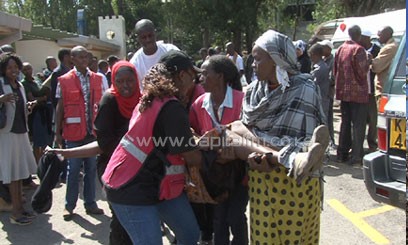
Twenty-eight year old Martin Mugambi was part of the Anti-Stock theft unit to be specific. He’d gone to Baragoi in Samburu just 10 days before he lost his life/MIKE KARIUKI
NAIROBI, Kenya, Nov 14 – A counsellor tries desperately to calm her down looking nervously around him, uncomfortable with the stares she’s attracted. A middle aged gentleman in a blue kaftan and a kufi stands next to her and he too tries to cool her rising temper by saying, “It is God who gave him to us. It was simply his time.”
“Our boy’s body was left out in the open for three days like a dog’s,” I hear her shout. “He was only 22-years-old,” she says wiping away a trickling tear.
We hear commotion behind us and quickly turn to look at the white van with green Arabic writing on its exterior. She falls to the ground; her anger forgotten, her head too heavy for her neck.
Twenty-two year old Abubakar had only just graduated from the Kenya Police Training College before being sent to Samburu. He was part of a contingent of officers sent to pursue cattle rustlers who had stolen 400 heads of cattle. A hundred and seven officers went down the dreadful Suguta valley on Saturday and only half of them got out.
Abubakar didn’t.
His body lies covered, headed to a cemetery.
It is said to be the worst attack on the Kenya Police since independence but for the groups of families that wait to view the bodies of their loved ones outside the Chiromo mortuary, the statistics mean very little.
“Most of those who died were new recruits,” Lillian Musyoka tells me. We sit waiting for Brian’s name to be called out. The entire time we talk we keep an eye on the green gate with the sign that reads ‘Body Reception.’ Contrary to its designation, that’s where the bodies of three slain officers have been wheeled out from.
The boot door of the ambulance that was to ferry the corpse to its final resting place jammed causing someone to murmur behind me, “vehicles used to ferry dead bodies always develop complications.”
“Why don’t we break it?” An officer helping to load the body says, banging his fist on the uncooperative door. No doubt riled up by the sight of fellow service men lifeless on stretchers.
The door finally opens. A friend or family member of the deceased makes the mistake of asking for gloves in the already emotionally charged environment attracting the chiding of one of the mortuary attendants clad in a white lab coat with the letters JG embroidered on it, “you lived with him, you ate with him, now that he’s dead you need gloves to lift his covered body?”
Lillian isn’t waiting for Brian’s body to be wheeled out. She came all the way from Mombasa to identify the corpse. Twenty-three-year-old Brian was an orphan. His only immediate family is his twelve year old brother; a brother whose upkeep Brian supported.
“He really wanted to join the police force,” Lillian, Brian’s aunt tells me, “the first time he applied he was rejected and so we told him to pursue a degree course. He refused and applied again.”









































